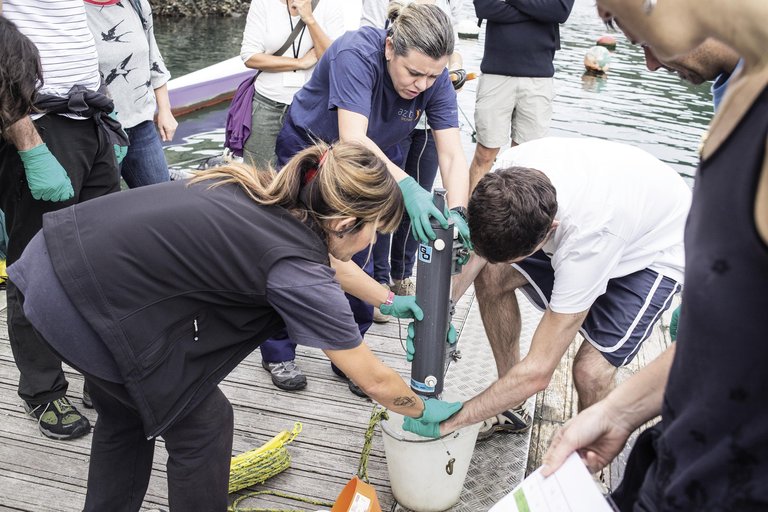Is citizen science the key to the science of the future?

Citizenship generates knowledge and citizenship generates knowledge. This is the reason for the German citizen science project GEWWISS, which summarizes the benefits that participation can bring to citizens and to science.
Citizen science is a very attractive concept. It is part of the European 2020 strategy and is one of the indicators of a whole philosophy. The RRI (Responsible Research and Innovation) is based on a new form of research that seeks ethics, scientific education, gender equality, a new form of government, open access to data and the accession of society. There is the science of citizens.
In addition, Elhuyar, aware of the benefits that citizen science can report, has aimed to promote it. For that comes Zientzia KIDE.
Integrating citizens into scientific projects
The Ciencia-KIDE project aims to disseminate the scientific lines of citizenship in collaboration with the scientific agents of Euskal Herria to bring some of its research to the public and to implement stable forms of collaboration among all.
But for this it is necessary that both society and research institutions appropriate the philosophy of this new way of acting in science and are willing to do so. In fact, while citizen science is an old practice, for most it is a new and unknown concept.
We have carried out the pilot project with AZTI-Tecnalia in Pasaia. The objective was to measure the quality of the waters of Pasaia Bay. To do this, two sampling points were defined, one inside the bay and one at the Pasai San Pedro pier. At both points, in addition, water samples were taken on the surface and in depth to check if there were differences in the parameters to be analyzed.
A dozen people participated in the research together with AZTI researchers. First they received an explanatory lecture, then they took samples and finally carried out a laboratory work guided by researchers. In the end, with the help of AZTI researchers, the results of the research were collected and it was commented that it was an interesting and enriching experience.
Benefits and challenges
Starting with the benefits of citizen science, I would highlight four.
First, science becomes more relevant in society when research lines of citizen interest are deployed.
Secondly, the results of the research are greatly enriched when citizen perspectives and local knowledge are integrated. In addition, the immense data collections that require certain research would be impossible without the voluntary work of citizens. For example, to investigate bird populations and migrations, the information provided by the population is key. Thousands of people observe birds and use their data to later analyze population changes or the evolution of migratory habits.
Third, in society scientific culture is intensified and a more critical society is built.
Finally, citizenship science offers more possibilities to actually apply research results to society, as it is easier to accept these findings and incorporate them into everyday life if you have participated in such research.
The European Association of Citizenship Sciences (ECSA) mentions two other benefits: the empowerment of citizens, that is, the sense of voice of citizens in scientific decisions, and sustainable, social and environmental development.
However, on this path there are also challenges: the need to increase economic funds, to implement citizen science projects and to train citizens in management, to expand synergies between science and scientific communication of citizens and to integrate citizenship science into education.
On the other hand, I believe that citizen science initiatives must have a minimum size to really influence society and the scientific system. More initiatives and more crowds are needed if we want their conclusions to really influence scientific policies and lines of research.
What are the consequences?
Therefore, citizen science projects go beyond data collection. It involves awareness, capacity building and strengthening of citizen communities. Building and maintaining trust is key to any citizen science project. Must pick up/give partner. It is not enough to collect data, information, knowledge, etc. of citizenship, but we must give it some useful and valid result.
The latest trends suggest that citizen science projects, rather than data collection, should be based on deeper participation. The difficulties that this entails must be foreseen from the beginning. For example, in many projects related to the science of citizenship, people's participation is very low once data collection is completed. Keeping more time involved is one of the challenges.
And when looking for participants, you have to take into account the motivation. Participants are more easily found in environmental associations, among activists, in people who have directly suffered a problem, for example if research is an environmental problem. And their contribution will be richer. However, keep in mind that these participants do not represent all citizens.
In short, the science of citizenship is not a science made for citizenship or citizenship, but a science with citizenship.
Buletina
Bidali zure helbide elektronikoa eta jaso asteroko buletina zure sarrera-ontzian











